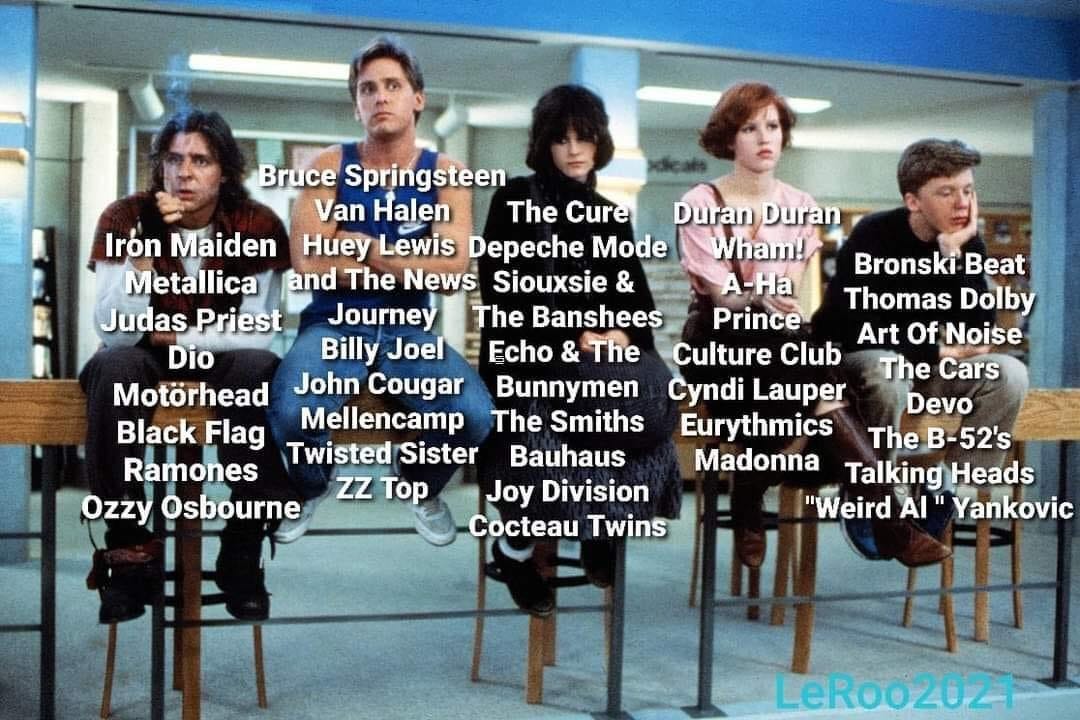Who Are You Most Likely To Trust?
A Breakfast Club photo has apparently set me off.

There’s this pretty cool blog post on Medium that talks about the powers of persuasive writing and this, somehow, made me think about my local community and politics.
To be honest, for someone who isn’t a politician, I think about this a lot.
Mostly, I think about what it takes to build a better community, a community that trusts each other, a community where people feel okay with posting their opinions on newspaper social media without making a fake Facebook account, or with speaking up at town meeting or in the grocery store, a community where people aren’t being afraid of being vilified for engaging in a discussion about a town budget or even library funding, let alone short term rentals and cruise ships and sustainability.
A lot, right?
In that blog post, Leslie Arambula is talking about rhetoric and persuasive writing and in it, she mentions ethos and writes:
“When considering using those or adding credibility to your writing or communication, consider your target audience.
“Who are they most likely to trust?
“What people or professions do they hold in high regard? Why?”
That why is so important.
Why do you trust your doctor?
Why do you trust this journalist instead of that one?
Is the person you trust always from the same demographic? Why?
There was a simple graphic that I saw on social media this morning. It broke up the characters from the ancient movie The Breakfast Club into music types.
Pretty much everyone who responded said things like, “Spot on! Me too. I was a mix of blank with blank with blank.”
And I looked at it and thought, “Where are the Black artists? The Latin music? Even the country music?” There’s no Whitney, no Stevie Wonder, no Chaka Khan, all top ten Billboard artists in 1985, the year the movie came out. There’s no Prince or DeBarge or Kook and the Gang. There’s no country artists, which I think Emilio’s character might listen to occasionally. And even for metal, Anthrax, Exodus, Slayer, Megadeath. That was 1985. But that character is more the Alarm, INXS, Marvin Gaye to be cool sometimes, Tom Waits, the Pogues to me.
And I thought, “I am not agreeing with at least two of the choices for two of these characters at all.”
And I thought, “I do not trust this photo and this explanation.”
And I thought, “Am I a curmudgeon?”
Was I being a bummer? Probably.
Was it because none of my music from the time was on there except for a couple bands? Maybe.
Was it because someone I didn’t know and therefore didn’t trust was making a statement I didn’t agree with? Possibly.
It might also have to do with the fact that I don’t know the poster or the creator or their thought process in constructing this image and that makes me not trust them the way I might trust someone else putting out the same thing.
Knowing the logic behind something helps you trust the product in front of you. Knowing the motivation behind someone’s words or deeds can help, too. This is true in communities, in families, friends groups and even random social media posts.
HUMBLE AND KIND
Dan Rather and his team posted on Substack yesterday, a short essay about Lori McKenna’s great song “Humble and Kind,” which was covered by Tim McGraw.
It had 229 comments, partly because it resonated, and partly because Dan Rather has that sort of trust (for many) that Leslie talks about in her post.
Trust is built for many of us. And it is eroded, too, bit by bit.
Laura Trappett writes,
“Trust is broken when we have a limited understanding of how a decision has been made or feel that leaders are out of touch. If we think that bias has influenced the decision-making process, or feel like our own perspectives have been pushed to the side to benefit a group with more sway, we won’t believe that a decision benefits us and may try to resist it.
“When governance processes become more specialized and complex, the distance also increases between citizens and decision-makers and we can feel disconnected. It’s essential to bridge that gap, especially when the solutions required to combat incredibly complex issues, such as the climate crisis require collaboration and buy-in from a wide variety of experts and community stakeholders.”
Edited to Add: After I put this out, Ray, a reader was nice enough to comment about how I had them until I mentioned Dan Rather.
They’re right. Dan Rather had a huge controversy in 2004 over a story where some documents couldn’t be verified about President Bush’s military record. He refused to apologize.
Yet, and this is to the point of the piece, people still love, follow, and trust Dan Rather and respond to a post from the pugnacious journalist about being humble and kind. Others? Not so much. Me? I’m mostly intrigued by his “Humble and Kind” post.
The question becomes why do people still trust him? Rather is hardly alone as people who have had scandals, have had missteps (big and little) and still maintain many (thousands) people’s trust. Some people have a scandal and that trust is winnowed away (or abruptly taken away). What is the difference?
HOW TO BUILD TRUST
According to a lot of experts, being humble and kind helps. Listening helps. Helping others helps. Speaking with respect helps.
Simple things like sending out the results of a survey after people took it builds trust. Doing what you have announced you will do? Builds trust. Sharing information? Starting conversations that actually matter? Builds trust.
And remembering, of course, to be humble and kind, and that all the people you deal with have worries and hopes and joys and loves and pains and needs and dreams, too. That helps a lot.
We can all be better at this. We can all expand our words and be kinder, be humbler, be better listeners. And I think we will.
Thanks for listening to my rant today!



I love your articles and your writing style, but you lost me when you put Trust and Dan Rather in the same sentence. You have a short memory…